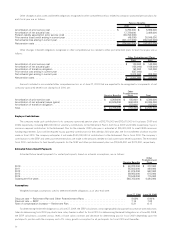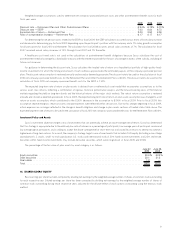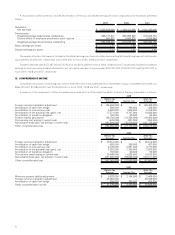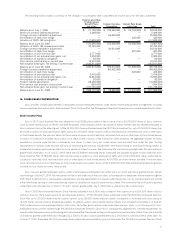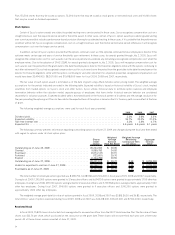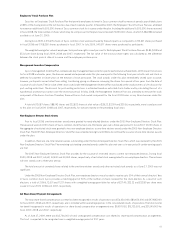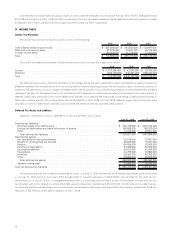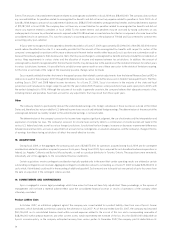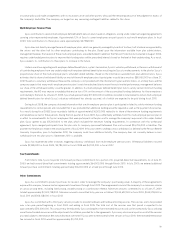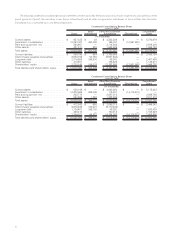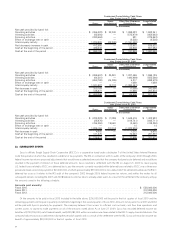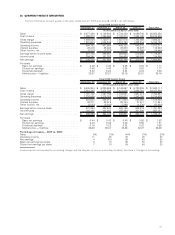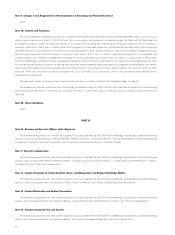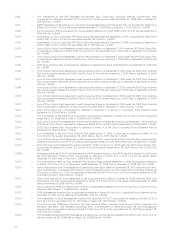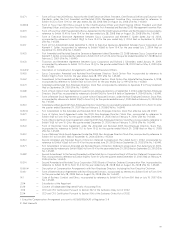Sysco 2009 Annual Report Download - page 79
Download and view the complete annual report
Please find page 79 of the 2009 Sysco annual report below. You can navigate through the pages in the report by either clicking on the pages listed below, or by using the keyword search tool below to find specific information within the annual report.insurance policy and made arrangements with its insurance carrier and other parties, who paid the remaining amount of the judgment in excess of
the company’s deductible. The company no longer has any remaining contingent liabilities related to this claim.
Multi-Employer Pension Plans
Sysco contributes to several multi-employer defined benefit pension plans based on obligations arising under collective bargaining agreements
covering union-represented employees. Approximately 12% of Sysco’s current employees are participants in such multi-employer plans. In fiscal
2009, total contributions to these plans were approximately $47,982,000.
Sysco does not directly manage these multi-employer plans, which are generally managed by boards of trustees, half of whom are appointed by
the unions and the other half by other employers contributing to the plan. Based upon the information available from plan administrators,
management believes that several of these multi-employer plans are underfunded. In addition, the Pension Protection Act, enacted in August 2006,
requires underfunded pension plans to improve their funding ratios within prescribed intervals based on the level of their underfunding. As a result,
Sysco expects its contributions to these plans to increase in the future.
Under current law regarding multi-employer defined benefit plans, a plan’s termination, Sysco’s voluntary withdrawal, or the mass withdrawal of
all contributing employers from any underfunded multi-employer defined benefit plan would require Sysco to make payments to the plan for Sysco’s
proportionate share of the multi-employer plan’s unfunded vested liabilities. Based on the information available from plan administrators, Sysco
estimates that its share of withdrawal liability on most of the multi-employer plans it participates in could be as much as $80,000,000 as of June 27,
2009 based on a voluntary withdrawal. Because the company is not provided with the information by plan administrators on a timely basis and the
company expects that many multi-employer pension plans’ assets have declined due to recent financial market performance, management believes
our share of the withdrawal liability could be greater. In addition, if a multi-employer defined benefit plan fails to satisfy certain minimum funding
requirements, the IRS may impose a nondeductible excise tax of 5% on the amount of the accumulated funding deficiency for those employers
contributing to the fund. As of June 27, 2009, Sysco had approximately $17,000,000 in liabilities recorded in total related to certain multi-employer
defined benefit plans for which Sysco’s voluntary withdrawal has already occurred, all of which are expected to be paid during fiscal 2010.
During fiscal 2008, the company obtained information that a multi-employer pension plan it participated in failed to satisfy minimum funding
requirements for certain periods and concluded that it was probable that additional funding would be required as well as the payment of excise tax.
As a result, during fiscal 2008, Sysco recorded a liability of approximately $16,500,000 related to its share of the minimum funding requirements
and related excise tax for these periods. During the first quarter of fiscal 2009, Sysco effectively withdrew from this multi-employer pension plan in
an effort to secure benefits for Sysco’s employees that were participants in the plan and to manage the company’s exposure to this under-funded
plan. Sysco agreed to pay $15,000,000 to the plan, which included the minimum funding requirements. In connection with this withdrawal
agreement, Sysco merged participants from this plan into its company-sponsored Retirement Plan and assumed $26,704,000 in liabilities. The
payment to the plan was made in the second quarter of fiscal 2009. If this plan were to undergo a mass withdrawal, as defined by the Pension Benefit
Guaranty Corporation, prior to September 2010, the company could have additional liability. The company does not currently believe a mass
withdrawal from this plan prior to September 2010 is probable.
Sysco has experienced other instances triggering voluntary withdrawal from multi-employer pension plans. Withdrawal liabilities incurred
include $9,585,000 in fiscal 2009, $5,784,000 in fiscal 2008 and $4,700,000 in fiscal 2007.
Fuel Commitments
From time to time, Sysco may enter into forward purchase commitments for a portion of its projected diesel fuel requirements. As of June 27,
2009, we had forward diesel fuel commitments totaling approximately $64,000,000 through March 2010. In July 2009, we entered additional
forward purchase commitments totaling approximately $16,000,000 at a fixed price through June 2010.
Other Commitments
Sysco has committed to product purchases for resale in order to leverage the company’s purchasing power. A majority of these agreements
expire within one year, however certain agreements have terms through fiscal 2012. These agreements commit the company to a minimum volume
at various pricing terms, including fixed pricing, variable pricing or a combination thereof. Minimum amounts committed to as of June 27, 2009
totaled approximately $2,074,738,000. Minimum amounts committed to by year are as follows: $1,434,622,000 in fiscal 2010, $535,978,000 in
fiscal 2011 and $104,138,000 in fiscal 2012.
Sysco has committed with a third party service provider to provide hardware and hardware hosting services. The services are to be provided
over a ten year period beginning in fiscal 2005 and ending in fiscal 2015. The total cost of the services over that period is expected to be
approximately $510,000,000.This amount may be reduced by Sysco utilizing less than estimated resources and can be increased by Sysco utilizing
more than estimated resources and the adjustments for inflation provided for in the agreements. Sysco may also cancel a portion or all of the services
provided subject to termination fees which decrease over time. If Sysco were to terminate all of the services in fiscal 2010, the estimated termination
fee incurred in fiscal 2010 would be approximately $9,700,000.
59



